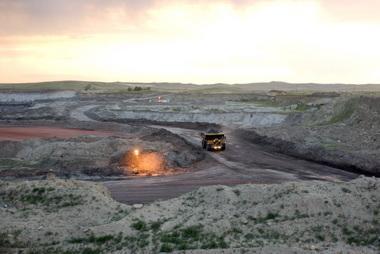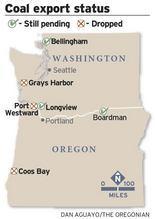
Cross Posted from OregonLive
By Scott Learn
Terminal developer Kinder Morgan on Wednesday dropped its proposal to export coal to Asia from a Columbia River port near Clatskanie.
The company’s decision means three of the six coal export terminals originally proposed in Oregon and Washington have gone by the wayside. It also significantly reduces the potential for coal train traffic through Portland.
Together, the three abandoned projects represent up to $550 million in investment, 305 permanent jobs — and nearly 50 million tons of Montana and Wyoming coal destined for Asian ports.
Kinder Morgan spokesman Allen Fore blamed site logistics for stopping the project, not the intense controversy over exporting coal from the green Northwest.
“We looked at multiple options and different footprints, but we couldn’t find one compatible with the facility we wanted to construct,” Fore said.
The Houston-based company, a terminal and pipeline operator, explored alternatives at the Port of St. Helens’ Port Westward industrial park near Clatskanie for 16 months but hadn’t applied for permits.
The logistics were complicated by Portland General Electric, which declined to allow coal storage piles near its Port Westward natural-gas-fired power plants for fear that coal dust would foul operations.

Kinder Morgan’s terminal would have likely generated the most coal train traffic through the Portland area among the six proposals, raising concerns about coal dust, diesel pollution and congestion. It would have sent up to 12 mile-plus trains a day through North Portland and along U.S. 30 to and from the terminal near Clatskanie.
Another export proposal at the Port of Coos Bay, which would have also brought trains through Portland, recently fell through. A proposed terminal in Longview, Wash., could run trains through Portland on Union Pacific tracks, though industry sources say the coal is more likely to travel on BNSF Railway’s Washington tracks.
Environmental groups cheered the news. Coal export would encourage China and other Asian countries to burn more coal for power, they say, even as U.S. utilities are cutting back in favor of cleaner natural gas and renewables.
Brett VandenHeuvel, executive director of Columbia Riverkeeper, said he thinks the vehement opposition played a role in Kinder Morgan’s decision.
On Monday, Scappoose’s City Council passed a resolution of concern on coal trains, he noted. And a Port of St. Helens proposal to expand Port Westward by 957 acres drew roughly 100 opponents to a hearing, with many concerned the expansion could be used to facilitate coal export.
Kinder Morgan’s decision “is a huge victory for the state of Oregon,” VandenHeuvel said. “We’ve proven over and over that coal export is not viable in the Northwest.”
John Mohlis, executive secretary of the Oregon State Building and Construction Trades Council, called the decision a disappointment.
Union leaders, coal companies and terminal developers say much of the coal is likely to be exported through Canada if Pacific Northwest terminals aren’t approved, generating train traffic but no jobs.
Kinder Morgan’s terminal “would have been built in an environmentally responsible way that would have provided good jobs for our members,” Mohlis said.
Kinder Morgan said the terminal would cost up to $200 million, providing construction jobs plus 80 permanent jobs. In March, Columbia County’s seasonally adjusted unemployment rate was 8.9 percent.
Patrick Trapp, Port of St. Helens’ executive director, said working with Kinder Morgan cost staff time, but wasn’t a loss.
The publicity over the coal proposal tripled inquiries about Port Westward opportunities, he said. Kinder Morgan also didn’t rule out pursuing other projects at the site.
With Kinder Morgan’s coal terminal off the table, three terminals are still under consideration, two in Washington and one in Oregon.
The pending projects: Gateway Pacific near Bellingham, Wash., at up to 52.9 million tons a year; Millennium Bulk Terminals in Longview, up to 48.5 million tons; and Ambre Energy’s Morrow Pacific Project in Boardman, up to 8.8 million tons.
The Bellingham and Longview terminals are in lengthy permit reviews. Morrow Pacific’s permit review has been delayed, but Ambre is still hoping the project will begin shipping next year.
It would receive coal by train at a Port of Morrow terminal, then ship it via covered barges to an existing dock at Port Westward for transfer to ocean-going ships.
Fore said Kinder Morgan is still looking for other coal export sites in the Northwest on behalf of coal mine customers, though he declined to name specific ports.
“We’re a customer-driven company,” he said, “and our customers are still looking at options in the Pacific Northwest.”
VandenHeuvel of Columbia Riverkeeper said he doesn’t expect more Northwest coal export proposals anytime soon.
“I think coal export is so toxic right now that we’re going to see existing proposals dropped before we see new sites added,” he said.

